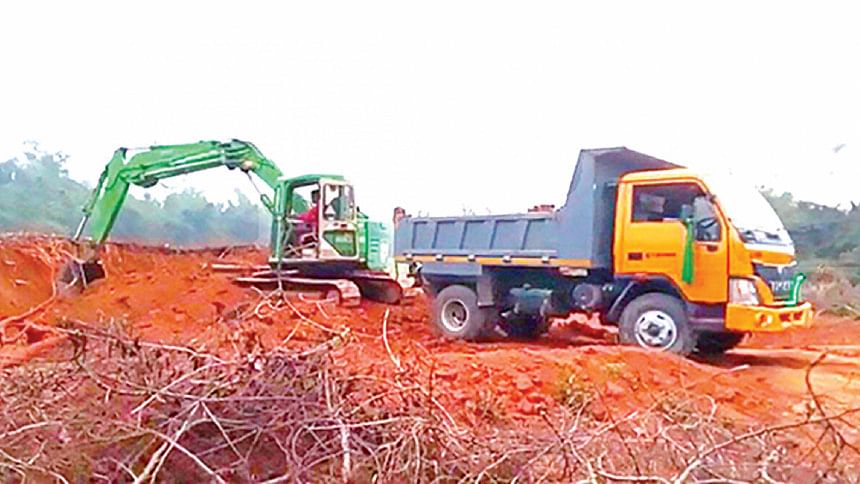The death of Tangail’s red hillocks

The drive momentarily stopped the perpetrators from cutting the hillocks but they came back again. Many carry out these activities during nighttime to avoid getting caught.
The cutting of the red hillocks in Tangail continues. With the help of people with political influence, soil traders are allegedly cutting and levelling the hills every day.
Environmentalists have blamed negligence on the part of the local administration and the Department of Environment (DoE) for this destruction.
However, the authorities concerned have mentioned the increasing demands of soil in various development projects as the cause of this illegal hill cutting. They blamed their dearth of human resources and the political influences of the offenders for their inability to act against them.
During recent visits, this correspondent saw that hillocks were being cut by excavators both from government and private land in different places of Madhupur, Ghatail, Sakhipur, Mirzapur and Kalihati upazilas of the district.
Masum Miah, an activist based in Ghatail, said, "The earth extracted from the hillocks is being used at brick kilns and for filling lowlands and making roads, including the expansion of the Elenga-Jamalpur highway.
He also mentioned that hillock cutting is going on in Nalma, Chhankhola, Garobazar, Kajla, Sagardighi and Tepukusharia areas, under the watch of local political activists.
Ghatail UNO Munia Chowdhury said when they got the information regarding the cutting of hillocks, they conducted a mobile court drive and fined and jailed the ones who were caught on the spot.
"The drive momentarily stopped them from cutting the hillocks but they came back again. Many carry out these activities during nighttime to avoid getting caught," she added.
Azharul Islam, officer-in-charge of Ghatail Police Station, said in the case filed by the DoE, eight trucks loaded with earth were seized. Their drivers were also arrested.
Tangail Court Inspector Tanveer Ahmed said they filed the case under the bailable section of the Environmental Act and the arrested drivers were bailed on the very day of the arrest.
In Sakhipur's Kakrajan, this correspondent saw soil being extracted from a hillock on a government land and being carried to a brick kiln on trucks.
Jamir Uddin, deputy director of the DoE's Tangail office, said hill cutting is a punishable offence according to Environment Laws, which can amount to a fine of Tk 2 lakh and two years in prison.
He also mentioned that the DoE has already filed four separate cases under section 6 (Ka) of the Environment Laws of 1995 in Madhupur, Ghatail, Kalihati and Mirzapur police stations in this connection.
"Those found guilty in the police investigation will be brought under the law," he added.
Gautam Chandra Chanda, divisional coordinator of Bangladesh Environmental Lawyers Association (Bela), said the authorities have information regarding those who are involved in the cutting of hillocks.
"Why are they detaining the workers or drivers of the soil-loaded trucks and not filing cases against the responsible soil traders and their patrons? Even the few hillocks that are still intact will not be spared if such attitude prevails," Gautam said.
"The local administration cannot avoid the responsibility of this. Dealing with the issue should be their priority now," he added.

 For all latest news, follow The Daily Star's Google News channel.
For all latest news, follow The Daily Star's Google News channel. 


Comments